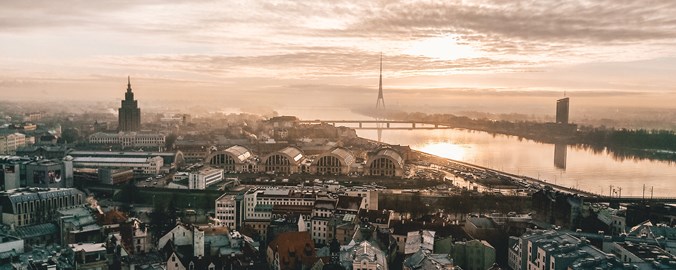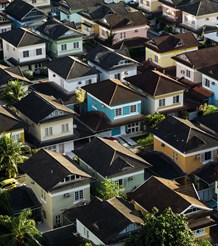
Latvia's Property Market Continues To Improve, With Price Rises Driven By Riga Sales
Latvia's Property Market continues to improve, with Price Rises driven by Riga Sales
In January 2017, Global Property Guide reported that Riga's residential real estate market had gone up by 9.75%, as foreign investors continue to purchase apartments in the country's capital at a robust pace. Supply of new builds is still weak, which has continued to plague the housing market, driving up prices.
Gradually though, housing supply figures are getting better. During the first three quarters of last year, new build completions rose by 2.3% to 1,635 units, compared to the same period in 2015, according to the Central Statistical Bureau of Latvia this represented an improvement of 15% in the new builds segment.
An investment of 275,000 euros can provide buyers with a 2-bedroom luxury penthouse in central Riga. Taking a two-hour drive or so out of Riga and heading west to coastal town Jūrmala, buyers with a Baltic Sea retreat in mind will find fully renovated villas with 5 or 6 bedrooms for between 470,000 euros and 1,250,000 euros that come with extensive gardens.
Outside of Riga house prices have been less dramatic, but in the capital sales for standard dwellings rose by 23%. Traditionally, Riga attracts house buyers from Russia and China, who are looking to buy a "Golden Visa" to gain a residence permit in an EU member state.
Residence permit rules for foreign (non-EU) investors underwent several amendments in 2016. House prices and demand dropped sharply in the wake of these Golden Visa rule changes. When Russian buyers deserted Latvia's housing market in 2015, house prices nose-dived by 20% to 30%, but now they are creeping up again steadily. This is partly due to a return of Russian investors, who discovered that the changes to the rules governing foreign real estate investment and residence permits were not so drastic after all, but also comes as a result of Brexit.
EU citizens fleeing migrant-unfriendly Britain in search of a better life look to beautiful Riga, and Latvians returning home from a stint in the UK are also driving demand and prices up.
Last year Riga saw the highest annual house price rise for nine years, where the average apartment's asking price increased by 9.75% year-on-year in the final quarter, rising to 1,159 euros per square metre, after a growth rate of a meager 0.28% in the same quarter a year before, according to data published by real estate agents OberHaus. Adjusted for inflation, this means Riga's apartment prices rose by 8.44% at the end of 2016.
The trend was confirmed by rival real estate agents Arco, whose figures showed that Riga's apartment prices shot up by 7.66%, or 6.37% in real terms, costing on average 703.00 euros per square metre at the end of last year. Arco calculates sales transactions slightly differently, hence the variance in price per square metre and percentage of growth. But their data still confirms that house prices are going up sharply in Latvia's capital.
Outside of the capital, both demand and house prices also went up significantly. Estate agents BALSTS reported to Global Property Guide that apartment prices in Ogre rose by 7.5% during 2016 to 477.00 euros per square metres. Ogre is one of Latvia's greenest towns, blessed with surrounding forests and boasting beautiful public parks.
In Jelgava, a welcoming city overlooking the banks of the River Lielupe, the average apartment price shot up by 9.6% during 2016, now costing on average 400.00 euros per square metre.
And Kauguri, a popular town in the western part of Jūrmala, recorded increases of 12.4% during 2016, bringing the average cost per square metre for an apartment to 470.00 euros. The town is popular with Russian buyers seeking a Baltic bolt hole for summer vacations.
According to BALSTS, estate agents throughout Latvia are optimistic the trend will continue this year: “All indicators show that the real estate market development, which has begun during the last two years should continue in 2017,” said the company's CEO, adding that the firm expected to see the average price growth rate to continue to rise.
The Bank of Latvia predicted the country's economy to grow annually by 3% this year, and with the Eurozone performing well (except for Brexit Britain) generally, there's no reason to assume that Latvia won't fulfil this promise.

